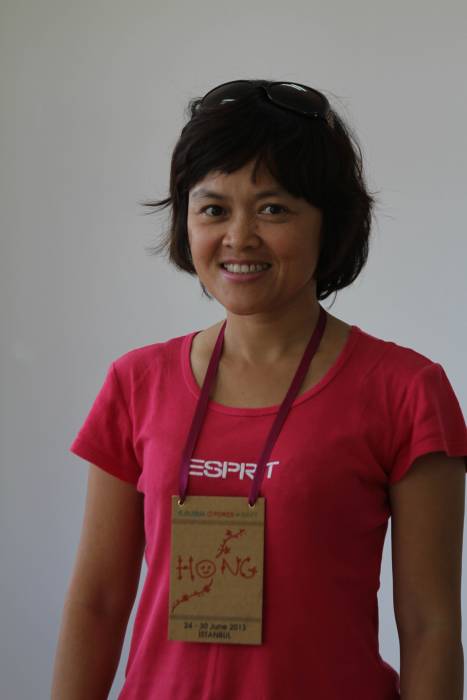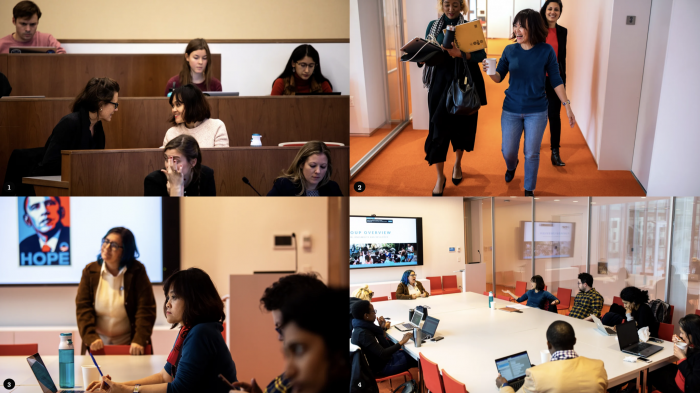
June 3rd, 2023: a somber day.
It was late into my Saturday afternoon when I was added into a new work chat. “Hi there”, the welcome message read, “setting up this group as a space for discussion re: comms strategy in support of Hong”.
Hong? I entered a quick cursory search ‘Hong breaking news’, which brought up a list of top stories from Hong Kong. Not what I was looking for. But as teammates began to respond, things became clearer. I learnt that ‘Hong’ was short for Hoang Thi Minh Hong, a renowned 50-year old climate activist from Vietnam. Three days ago, on the 31st of May, Vietnamese authorities arrested her under tax evasion charges. Allegations against Hoang Thi Minh Hong are politically motivated, one Guardian subtitle read, coming amid similar prosecutions against other environmental activists.
Still, I was curious. Only having been with 350.org for just over a year, I was admittedly a fresh-face in the climate movement. I knew arrests of activists were all too common, particularly in regions that frowned on the freedom of expression. But there is no one size-fits-all campaign in the fight for freedom. How would we approach this delicate situation with tact and diplomacy?
One of my first solidarity efforts was campaigning for the release of nine Ugandan university students who had been arrested for protesting against the East African Crude Oil Pipeline (EACOP). I took great solace in that effort. It was the moment I first learnt that the climate movement wasn’t just about advocating for sustainable solutions, technicalities with decarbonization, or renewable energy. The focus was people, in particular the vulnerable and marginalized. I watched as over a hundred civil-society organizations quickly came together to petition for their release.
With the Hong-response team, I observed the same urgency. As we met and discussed the situation, there was a palpable sense of concern — the kind you demonstrate when someone you know and love is in danger. Soon enough, I discovered that Hong wasn’t just any renowned activist. She was also a former colleague. Or rather, as it was repeatedly implied, she was more than a former colleague. Hong was a part of the 350 family.
Over subsequent days and weeks, the news of Hong’s arrest made rounds in the mainstream media. Hong is renowned for good reason. In 2013 Hong started her non-governmental organization, Center of Hands-on Action and Networking for Growth and Environment — abbreviated as ‘CHANGE’. In Vietnamese the word ‘change’ translates into ‘su thay doi’: making differences. Hong believed that the best way to make a difference was by promoting community awareness about the environment among the youth. Her mission is to highlight Vietnam’s most critical environmental challenges — including wildlife trade, climate change, and pollution. Suffice to say, she has been remarkably successful. Five years after the organization’s inception, on June 7th, 2018, CHANGE was named “Vietnam’s Best Environmental Organization in 2017” by Nhip Cau Dau Tu, a leading business magazine in Vietnam.
By the time of Hong’s arrest, CHANGE was listed as defunct. Non-operational. Nearing the end of October 2022, Hong announced on Twitter that she would be closing down her NGO after 10 years of operation. This decision came amid intense pressure on civil society in Vietnam, and fear of repercussions for her activism. Indeed, the story that accompanied the news of Hong’s arrest was that four other climate activists had been arrested in Vietnam over the past two years. All under the same charge of tax evasion.
The more I worked on Hong’s story, the more my conviction grew. The international outcry was real. Hundreds of solidarity messages poured in; from photos of people carrying “#FreeHong” signs to videos of people sharing how Hong had personally impacted them. Hong is undeniably a star in her own right. As the messages grew, so did my curiosity. How have so many people across the world been impacted by Hong? To answer this question I reached out to Débora Gastal, the 350 Languages and Editorial team lead, who first met Hong 7 years ago in Spain. When I asked her about her memory of Hong, she recalled a celebration song Hong produced.

People from around the world carrying #FreeHong placards
“Every time I’ve met in person with colleagues, we either listen to the song together, and dance or sing to it. And it’s impossible to do that without thinking about Hong,” Débora told me. The song, as I came to understand it, was created for the event called Global Power Shift that happened in 2013. This was a big in-person training 350 did in Turkey 10 years ago, which saw 500 young climate activists come in from more than 130 countries.

Hong at Global Power Shift 2013
“Even ten years ago, Hong was so well connected, so active, so eager to do creative things”, Debora continued, “that she mobilized artists in Vietnam to create this song for the event. I think even some pop stars in Vietnam actually participated in it.”
Hong’s eagerness and ability to connect with people in creative ways was echoed by a former 350 Taiwan volunteer, Vivian Lung, who first met Hong in 2017 at a 350 organized East Asia Climate Leadership camp in Taiwan. Hong had been invited as a speaker for the event, and Vivian was then a fourth year student, studying environmental and climate policies. Despite the age gap, Vivian recalled Hong being incredibly friendly and bubbly. “As I got to know her more, I discovered she really cares about the youth”, Vivian told me over FaceTime. “She was really passionate about what she was doing.”

Hong dancing with East Asia Climate Leadership Camp participants
The more I connected with people who knew Hong, the more I began to see personal anecdotes aligning with reports from the media. I understood why the outcry was as large as it was. Hong’s penchant for forming deep connections with people was reflected in her numerous awards. People clearly think well of her. With her contributions at the 2015 United Nations Conference on Climate Change held in Paris, for instance, she was recognized as a Climate Hero by ClimateHeroes.org. In 2019, Forbes listed her as one of the fifty most influential women in Vietnam.
But perhaps most notable of all was her time as an Obama Foundation Scholar. In 2018, Hong was one of twelve civic leaders from twelve nations to make up what would be the first cohort of the Obama Foundation’s program. Candidates were described to have ‘demonstrated a commitment to finding solutions to challenges in their communities and countries”, and Hong, with her clear vision for mobilizing youth towards environmental and climate wins, was an obvious choice. Her passionate, bubbly personality, that so many talked about with affection, is palpable through the photo feature on the organization’s website.

Hong during her time as an Obama Foundation’s Scholar
The ex-US President, I came to learn, is a big deal in Vietnam. With Hong being an Obama Foundation Scholar, and with Obama’s popularity in the country, appealing for his public support for Hong’s release appeared to be a natural course of action.
But a few colleagues expressed caution.
“It’s worth noting”, wrote Asia Regional Finance Campaigner, Chuck Baclagon, “that U.S. and European pressure towards Vietnam about human rights may not sit well with the government, given that millions of Vietnamese civilians were killed by both the US and its NATO allies during the Vietnam war, while France colonized Vietnam for 6 decades. As far as the Vietnamese government is concerned, these countries have no moral ascendance to talk to them about human rights.”
With the numerous approaches we could charter, one thing became clear. We needed to remain diplomatic. It was repeatedly emphasized that the main objective was securing Hong’s freedom. Although the window of opportunity was slim, this was the end goal. It stood to reason, of course, that if this was indeed a politically motivated arrest, further antagonization wouldn’t help Hong’s case. It would guarantee jail time, and further jeopardize the safety of other activists in the region.
I had often heard that 350 was “movement generous”. What I took this to mean was that 350 was an ‘empowering organization’ — lifting marginalized voices, and making their struggles tangible on the global stage. Speaking to Chuck allowed me to learn that the generosity extended so much further than what I had earlier conceived. It extended to empathy.
“I think that’s the brilliance of Hong,” Chuck responded, when I asked him how he or Hong would take empathy into account in the fight for Vietnam’s transition away from coal.
“While she knows the A, B, Cs of why we should transition away from coal she also knew that the transition should be built upon empathy and a desire to transform society into one that is not only sustainable but also one that values the continuity of history and sees it as something to build on as we create pathways towards the kind of future we want.”
On the 20th of June, 350 joined 64 other international human rights, free expression, and environmental organizations to put out a statement of appeal to the Obama Scholars program. Two days later, Hong was formally charged by Vietnamese authorities. If the charges go through, Hong faces a possible seven years in jail. So far, the Obama foundation has shown solidarity, but not with a direct response or an open statement to our appeal.
Hong’s powerful personality, and the immense unfairness of what she’s being put through, has given me the chance to explore the depths of 350’s solidarity. It has strengthened my own spine to see that this is what we mean when we say “350 is a movement generous organization”.
350 truly endeavors to support activists from all around the world — not only empowering them to become climate leaders, but also demonstrating sincere solidarity in times of need. When one of them is at risk, we mobilize legal aid, bring together strategic partners, and create platforms to generate the necessary public support.
There is no doubt that this whole ordeal is immensely trying for Hong and her family. But where I was apprehensive before, I now can profess with full conviction: we won’t rest till Hong’s out of jail.
I look forward to that day. I can’t wait to meet her myself.
Join us in calling for a just and equitable response to climate change:
One that empowers civil society to meaningfully participate in the development and monitoring of climate deals, without fear of persecution.
Take action by sending a letter to a minister in your region, asking them to urge the Vietnamese government to release Hoang Thi Minh Hong and all climate defenders.
The post Behind the scenes: Building Climate Solidarity appeared first on 350.

 10 months ago
43
10 months ago
43


